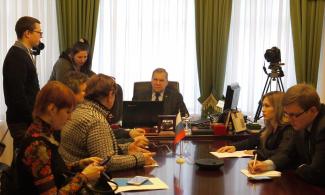
Undergraduate and graduate students of RUDN University shared results of their research to improve the world
Graduate students of RUDN University from Cuba, Costa Rica, Nigeria and Russia, as part of the International RUDN University press club, discussed with media representatives practical implications of their scientific research in Asia, Africa and Latin America.
Yarelys Herrera Diaz, a Cuban graduate student of the Agro-Technological Institute, is conducting research on the topic “Сharacterization of microbial groups associated to coffee culture (Сoffea spp.) and their potentials in the stimulation of the plant growth”. According to Yarelys, one of the causes of global pollution is usage of mineral-based fertilizers and poisonous chemicals in agriculture. To solve this problem, many countries use the technology of effective microorganisms: in Asia – in Thailand, Malasia, Indonesia, Philippines, South Korea, Taiwan, Pakistan, Bangladesh, India, China; in South America – in Brazil, Argentina, Bolivia, Peru, Nicaragua, Mexico. Dissertation of Yarelys Herrera Diaz is, for the first time, focusing on the topic of using effective microorganisms in Cuban agriculture. In practice, results of this work can be implemented soon because use of nitrogen-fixing bacteria does not require large investments. As of now, theoretical part of her work is done and field research is about to commence. As a result, both effectiveness of coffee cultivation and ecology are expected to improve. Additionally, this technology is easy to implement and does not demand large investments. According to this graduate student of RUDN University, two years has been invested into this research.
googletag.cmd.push(function() { googletag.display('content1'); });
Joshua Orabiyi from Nigeria is a student at the Philological Faculty. His topic is “Reflection of Nigerian Reality in Russian Media” and he believes that the main goal is to make sure Nigerian events are truthfully covered in Russian media. The young scientist is concerned that a biased coverage of Nigeria can adversely affect how the country is perceived in Russia. Nigeria and Russia have developed deep ties: many Russian companies have employees stationed there (Lukoil, RUSAL, Gazprom), Russian professionals are working as consultants for numerous production, agriculture and defense enterprises. Media affects how this cooperation is perceived. Joshua Orabiyi further noted that the African continent receives just 1% of global scientific coverage while it houses 12% of the world's population.
googletag.cmd.push(function() { googletag.display('content2'); });
Peter Sokov, graduate student of the RUDN University Institute of Medicine, researches the mechanisms of effectiveness of intraosseous blocade to cure pains. A lively discussion developed around the topic of technology's costs and its potential usage in Asia and Africa. The researcher claims that the technology does not require large investments and is easy to implement anywhere. In fact, it has been implemented in Russia, with promising results.
Dissertation of Esteban Azofeifa (Esteban Josué Azofeifa Gómez) is named “Development of structural dynamic knowledge representation models in multi-agent systems” and focuses on solving a number of important questions related to artificial intelligence, a technology the young scientist believes can improve life on the planet. Artificial intelligence is not a “robot with brains”, a powerful computer limited by its software, as is commonly considered. For example, Deep Blue supercomputer that defeated the world chess champion cannot be used in medicine. Though many Silicone Valley luminaries like Elon Musk claim that artificial intelligence is an existential threat, Esteban Azofeifa believes it can solve a range of modern problems, problems like data ambiguities and textual contradictions. If you can endow a device with intelligence, it will find and eliminate ambiguities and contradictions. Esteban Azofeifa can continue his work in any country or work for a multi-national company.
Undergraduate and graduate students of RUDN University’s various faculties further noted the wide range of opportunities to receive a classic education that the university offers. For example, medical students receive instructions in physics from lecturers of the Faculty of Science. Young scientists also noted the benefits of the University’s multi-cultural exchange and expressed willingness to further work on promoting their research, improve lives all over the planet.
About RUDN University
http://www.rudn.ru/en_new/
RUDN University is a multi-disciplinary Higher Education Institution, bringing together more than 30000 undergraduate and graduate students, as well as interns from 154 countries. National and ethnic diversity is one of the distinctive features of the University. There are several subdivisions providing qualitative academic training at all levels, such as bachelor, master and doctoral programs and internships in 5 faculties, 11 institutions and 1 academy. More than 130 Joint Degree programs are provided by wide range of leading partner universities from Great Britain, France, Spain, Italy, Czech Republic, Germany, and China. 25 undergraduate and graduate degree programs achieved International accreditation. Almost 50 programs are provided in English language. There is an opportunity for all students to choose from 12 foreign languages and receive an additional degree certificate in Translation Studies. Graduates will get standard European supplement to Degree Certificate scored in Trans-European system of credits (ECTS).
Number of educational programs for higher education (RUDN University only, without branches) – 467
Foreign language programs (English, Spanish) – 49
Quantity of joint educational programs with universities partners (double diplomas, inclusive education) with partner universities – 130
Additional education
Quantity of additional education programs – 1600
Number of participants annually involved in additional educational programs – about 20 000
Total number involved in all types of programs – more than 30 000 people
Total amount of foreign students – more than 7 500 people
More than 8000 students from 154 countries live in RUDN University hostels
googletag.cmd.push(function() { googletag.display('comments'); });